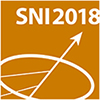Speaker
Description
In gas production fields the extraction of massive gas volumes from the geological underground caused subsidence up to about 30 cm and increased the regional seismicity.
We consider the geomechanical issues of the increased seismicity due to hydrocarbon production, especially the coupling of reservoir pore pressure and in situ stress. Models cannot considered reservoirs where stress changes and pore pressure changes are decoupled from one another: Observations in numerous reservoirs show that the rate of minimum horizontal stress change is coupled to approximately 50-80% of the rate of pore pressure depletion due to gas production. This is critically dependent on the effective Biot stress coefficient. It can be derived from the coefficient of the dry bulk modulus of the rock and the bulk modulus of the mineral grains of the rock.
A triaxial pressure cell with the possibility to apply axial, confining and pore pressures equivalent to those of hydrocarbon or geothermal reservoirs has been developed and manufactured were used for in situ stress experiments at the neutron time-of-flight stress/strain instrument EPSILON at beamline 7A of the pulsed neutron source IBR-2M, JINR Dubna for studying this rock behaviour.

